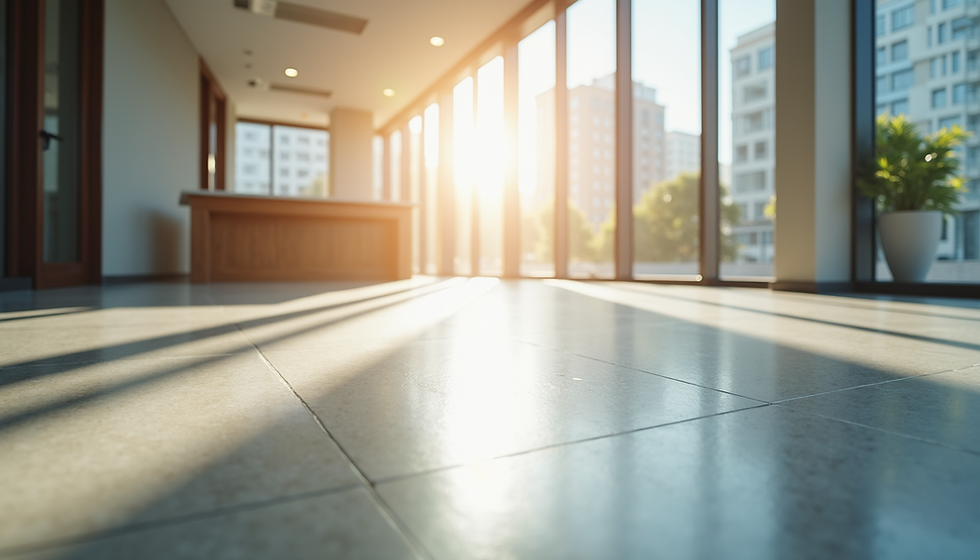Flooring and Allergies: Choosing Hypoallergenic Options
- Carter Banks
- Sep 16, 2024
- 3 min read

For allergy sufferers, choosing the right flooring is crucial to maintaining a clean, healthy environment at home. Allergens like dust, pet dander, and mold can accumulate in certain types of flooring, triggering symptoms like sneezing, itchy eyes, or breathing difficulties. In this blog, we’ll explore hypoallergenic flooring options and provide guidance on choosing the best materials to keep allergies at bay.
1. Understanding Allergies: What is it? What to Look for in a Floor
Allergies occur when the immune system reacts to substances (allergens) like dust mites, pollen, or pet dander. These allergens easily get trapped in carpets and other soft flooring materials, leading to poor indoor air quality and exacerbating allergy symptoms.
When choosing flooring for allergy sufferers, it’s essential to consider materials that are:
Non-porous and resistant to dust and mold
Easy to clean to reduce allergen buildup
Low in VOCs (volatile organic compounds) to improve air quality
Hard surfaces rather than soft, which can trap allergens
Least Allergy-Friendly Flooring: Carpets
While carpets can add warmth and comfort to a home, they are one of the least allergy-friendly options. Their fibers trap dust, pollen, pet hair, and other allergens, making them difficult to clean thoroughly. Even regular vacuuming may not remove all the particles trapped deep within the fibers.
2. Better Options for Allergy-Friendly Flooring
There are several types of hypoallergenic flooring that reduce the accumulation of allergens while providing durability and style. Here are some of the best options to consider:
Laminate & Vinyl Flooring
Both laminate and vinyl flooring offer smooth, hard surfaces that do not trap allergens, making them excellent choices for allergy-prone households.
Laminate flooring is easy to clean and resists moisture, which helps prevent mold growth. Its sleek surface repels dust and debris, reducing allergen buildup.
Vinyl flooring (particularly luxury vinyl tile or plank) is another low-maintenance, allergen-resistant option. It’s water-resistant and can be installed in kitchens, bathrooms, and basements, where moisture can cause problems.
Why they work for allergies: Both materials have sealed surfaces that don’t harbor dust mites, mold, or pet dander, making them easy to keep clean with regular sweeping or mopping.
Engineered Hardwood
Engineered hardwood is a great alternative to traditional solid hardwood floors for allergy sufferers. It consists of a thin layer of hardwood on top of plywood, making it more resistant to moisture and temperature changes. Unlike carpets, engineered hardwood doesn’t trap allergens and is easy to clean with a vacuum or broom.
Why it works for allergies: The smooth surface prevents dust and allergens from getting trapped. Plus, its durability ensures long-lasting performance.
Tile and Stone Flooring
Tile and stone flooring are among the best choices for allergy-friendly homes. These materials are non-porous, making it difficult for allergens to cling to the surface. Both tile and stone floors are water-resistant, reducing the chances of mold and mildew growth.
Why they work for allergies: Tiles and stone are resistant to moisture and allergen buildup. They’re easy to clean with a mop, keeping your environment allergen-free.
Solid Hardwood
Solid hardwood remains one of the top choices for hypoallergenic flooring. It’s durable, long-lasting, and doesn’t trap dust or allergens. Unlike carpets, hardwood floors can be easily swept, vacuumed, or mopped to remove allergens.
Why it works for allergies: Hardwood has a smooth surface that won’t hold onto pet hair, dust, or mold. It’s also a natural material, making it ideal for maintaining healthy indoor air quality.
Natural Flooring Options
For those looking to take a more eco-friendly approach, natural flooring options like cork or bamboo are worth considering. These materials are hypoallergenic and resistant to mold and mildew.
Cork flooring naturally repels dust mites and has antimicrobial properties, making it a great choice for allergy sufferers.
Bamboo flooring is similar to hardwood in its hypoallergenic properties but is also highly sustainable.
Why they work for allergies: Both cork and bamboo have natural resistance to allergens, making them perfect for allergy-sensitive homes.
Prioritize Your Health with Hypoallergenic Flooring
If you or your family members suffer from allergies, choosing the right flooring can make a big difference in the air quality and comfort of your home. Hypoallergenic flooring options such as vinyl, laminate, engineered hardwood, tile, and natural materials like cork and bamboo provide allergen resistance while offering style and durability.
Ready to upgrade your floors with an allergy-friendly solution? Contact Magoflooring today for expert advice and professional installation!



Comments